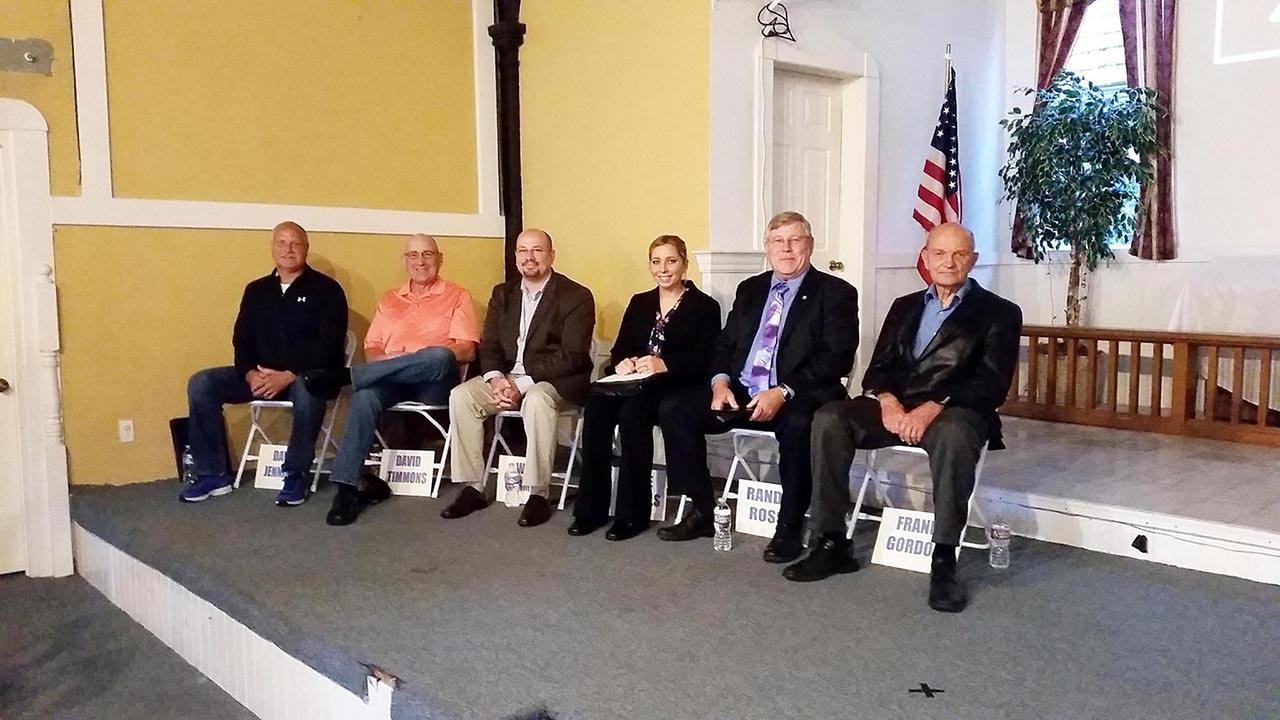Candidates for major Grays Harbor County offices included on the Nov. 8 General Election ballot fielded questions from about 40 potential voters during a political forum sponsored by the League of Women Voters of Grays Harbor County and Jodesha Broadcasting in Hoquiam on Tuesday evening.
Two of the three county board of commissioners seats are contested.
Dist. 1 Commissioner Wes Cormier faces Jamie Nichols, and Dist. 2 Commissioner Frank Gordon is competing against Randy Ross.
Also on the November ballot is Grays Harbor Public Utility District Seat 2. Incumbent Commissioner Dave Timmons is running against David Jennings.
Each commission candidate had distinct answers when asked about how they would improve budgeting.
“We need to get state legislators off their heinys and stop sending mandates down,” Gordon said. “The state is taking money from us. People need to start squawking.”
Gordon also said this next budget process will require the commissioners to cut services.
His opponent said looking to the state wasn’t viable and that there was only one sure way to fix spending.
“To blame the legislature — it’s easy,” Ross said. “We’re going to have to grow the economy.”
Nichols said she thought the best way to ensure county services remain intact was to encourage new business to start up or move to the county and pointed to the leasing of property in the Port of Grays Harbor’s Satsop Business Park to a marijuana grower as an example.
“The budget is looking very slim,” she said. “Grow hemp for industrial purposes.”
Cormier said he has been a conservative county budget proponent who wanted to keep it to about $26 million.
“If the commissioners had stuck to my budget, we’d be in the black right now,” he said.
Washington’s Clean Energy Initiative 937 ensures that a minimum of 15 percent of the electricity the state gets is from clean, renewable energy resources. Both PUD candidates said it has been a struggle for the district to keep costs down because of it.
“We pay a large cost for energy we do not need,” Timmons said.
Jennings brought up the initiative repeatedly as a major problem for the PUD.
“We’re in this contract for energy,” Jennings said. “We need to be heard. We need legislators to amend this so all hydroelectric plants qualify as clean energy.”
Older facilities do not, however. Timmons said such an effort would be an uphill climb to get legislators to amend or strike down the initiative.
For legislators, “it feels good but for us, (the initiative) doesn’t work.”
County Commissioners were asked what should be done to help the county’s population of homeless veterans. The group of candidates recognized that it’s a complicated issue with many facets and contributing factors. There isn’t enough low-income housing and many of the people living on the streets suffer from an array of physical and mental health problems.
While Cormier thought the county has been moving in the right direction with such efforts as the 10-year plan to address homelessness, “there is no silver bullet.”
Nichols expressed frustration with the county reducing its rent payment to low-income residents to help them stay in their homes. It’s allocated once every two years and had been $800 but is now just $500.
“There are not many houses in that price bracket,” she said.
Both Ross and Gordon said more and faster actions to help this population were necessary.
“Our state is at a crossroads with the mental health crisis,” Ross said. “We need to do more.”
He suggested using more of the county revenue set aside for the homeless to address immediate needs.
Gordon said efforts that have been to simply hand out hygiene packets, for example, don’t solve the problem.
The population has “some real, real issues,” he said. That includes self-medicating to alleviate mental health issues for which they aren’t getting treatment and somewhere they can stay and lock up their personal belongings.
All of the candidates were asked how they’d measure success of a policy they championed.
Timmons said he would refer to the PUD’s mission statement to determine whether something is working out well for the customers and the district. Jennings said “data is only as good as what you put into it.”
Cormier said citizens measure their success because they vote for people to represent them every four years. Nichols said there plenty of resources to measure effectiveness online and that there was plenty of information available to formulate solutions by looking to how other cities and counties that have dealt with similar situations.
Ross said qualitative or quantitative criteria was important but that it had to be determined whether the county fared better as a result. And Gordon, said getting into the community and finding out what they need — if done consistently —provides the answer.



